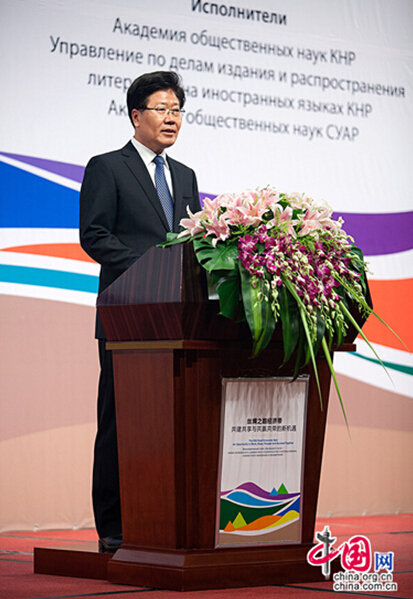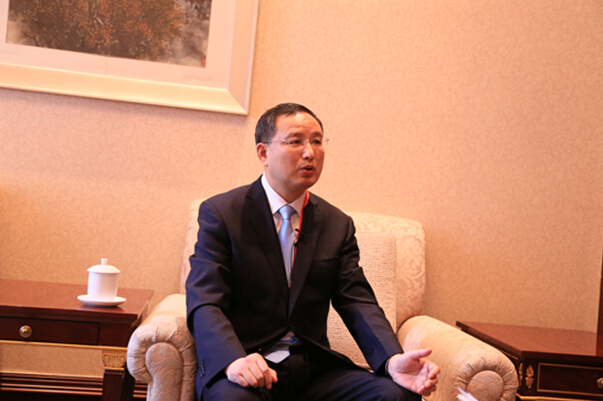Xinjiang to become core zone on the Silk Road Economic Belt
- By Zhang Lulu
 0 Comment(s)
0 Comment(s) Print
Print E-mail China.org.cn, June 30, 2014
E-mail China.org.cn, June 30, 2014
|
|
| Zhang Chunxian, Party Secretary of the Xinjiang Uygur Autonomous Region, addressed an international seminar on the Silk Road Economic Belt held in Urumqi, the capital city of Xinjiang, from June 26 to 27. [Photo/China.org.cn] |
Chinese President Xi Jinping proposed the Silk Road Economic Belt during his central-Asian tour last year. Bordering central Asia and as a gateway to Eurasia, west China's Xinjiang Uygur Autonomous Region is aiming to become the core zone on the Silk Road Economic Belt.
Zhang Chunxian, the Party Secretary of Xinjiang Uygur Autonomous Region, addressed an international seminar on the Silk Road Economic Belt held in Urumqi, capital city of Xinjiang, from June 26 to 27.
Zhang said in his speech that Xinjiang will "make full use of its geographical and cultural advantages, further open up and make efforts to act as the main force and vanguard in building the Silk Road Economic Belt."
|
|
| Zhang Chunlin, director of the Xinjiang Development and Reform Commission gives an interview with China.org.cn on the sidelines of the Silk Road Economic Belt International Seminar held in Urumqi, capital city of Xinjiang Uygur Autonomous Region on June 26. [China.org.cn/Zhang Lulu] |
Xinjiang is aiming to become a traffic hub, a commercial logistics center, a financial center, a cultural, scientific and educational center, and a medical service center in the region, as well as a large-scale national oil and gas production, processing and reserve base, a large-scale coal, coal power and coal chemical base, a large wind power base and a national energy resource corridor, Zhang said.
Traffic and trade
With two railway ports already in full operation, Xinjiang will build four more to connect the region with the Eurasian continent by 2020, Zhang Chunlin, director of the Xinjiang Development and Reform Commission, said.
Xinjiang now boasts 16 airports, and the region will see an increase of four to six new airports and some others will be renovated or expanded in the following three years.
Based on the three existing bonded zones in its Dzungarian Gate, Kashgar, and Khorgos, the heartland of Eurasia will further build five other bonded zones, which will lay a solid foundation for the negotiations of the long-anticipated China-Central Asia free trade area, Zhang Chunlin said.
The five ports will look to Mongolia, Kazakhstan, Russia, Central and Western Asia and Europe at large.
Anti-terrorism
Arrays of terrorist attacks have taken place in Xinjiang in the past year. In response, China has launched a severe anti-terrorism campaign.
"Anti-terrorism campaign and ensuring social stability will exert a positive role on the development of the Silk Road Economic Belt," Zhang Chunlin said.
"Currently terrorism has not had any impact on the key projects in the region. For example, eight large-scale state-owned enterprises are still investing in the coal electricity industry in the region," Zhang said.
The CPC Central Committee held a key conference on Xinjiang at the end of May, encouraging Xinjiang to further open up and become the core zone on the Silk Road Economic Belt.








Go to Forum >>0 Comment(s)